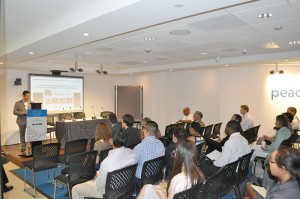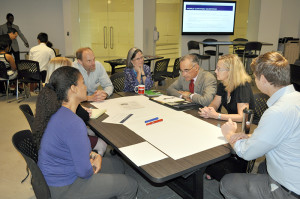CreativeU’s ‘World Café’ highlights new trends in online learning
By Hibaq DougsiyehJuly 16, 2015
Online learning is no longer just a “First World” luxury. Indeed, a panel of experts said it has taken hold and will only continue to grow globally and be a key tool in promoting development.
Former U.S. Education Department Deputy Secretary Jim Shelton said that e-learning provides an “enhanced learning experience” and is an opportunity to introduce a clear, user-friendly structure that makes learning easier.
There is an “open availability of content” in many professional fields online, Shelton noted in an address to the audience of the e-learning webinar, but it lacks structure in learning about that particular content.
E-learning provides such structure and enhances the learning experience.
CreativeU—an e-learning portal powered by Creative Associates International—hosted the June 16 “World Café” and online webinar with four experts in technology, international development or education on the promising practices of online learning, the current trends in the field and the feasibility of providing Internet access for all.
Sean Carroll, CreativeU’s Director and the moderator of the World Café webinar, said statistics show that the use of online learning is becoming more efficient in the classroom.
“In 2011, only about 5 percent of learning was online and about 45 percent was blended. The rest, solely in classroom,” Carroll explained. “By next year, 75 percent will be blended, 15 percent online and 10 percent solely classrooms.”
Demonstrating the results is key
In order to illustrate the importance of online learning, Senior Education Technology Specialist at USAID Tony Bloome explained that development professionals must gather evidence to prove the promising opportunities of technology and education that will help us make this case. Initial evidence from the U.S. Education Department has shown a slight learning retention gain by using a blended combination of online and in-person learning activities.
“What we know less about is the impact of technology in education, what we’re missing is evidence of use of technology in or outside of the classroom,” Bloome stated at the webinar.
“If we could figure out a way to bring all the districts together with all of the relevant communities, government and philanthropists, and understand what those challenges are and then pull the money so that we can have the results, the way that would encourage funding resources that would really attack some of these problems, whether they’re in international development or domestic, through e-learning, I think we could really achieve greatness.”
 Access to the Internet is also vital, particularly in developing countries.
Access to the Internet is also vital, particularly in developing countries.
White House Senior Advisor on Technology Policy Dipayan Ghosh said that it would not require a significant amount of funding to provide fiber-optic fiber cables to countries that lack high-speed connections. However, he acknowledged there are institutional obstacles to making it a reality.
“There is no central agency or authority that can bring the right group of philanthropy and industry and government together to help make that happen,” Ghosh explained at the CreativeU e-Learning Webinar.
On the topic of e-learning challenges, the panelists discussed how delivering methods for content may lead to “bad content.”
TechChange Chief Operating Officer Christopher Neu stated that the distribution of bad content is “something to be very careful about.”
“The question here is how do you approach that problem?” Neu said. “What kind of learning module reaches the scale? One of the ways that we try to think about it is by disaggregating that problem. Online learning is what we like to think of as a platform/content facilitation.”
In order to tackle the challenge of poor content, Bloome noted that distributors should keep in mind how they can make their material interesting and keep the users engaged.
One of the great benefits of being able to use multimedia and other platforms, Bloome stated at the webinar, is the “multiple intelligences” which supports learner engagement. Bloome also illuminated how the “language of instruction” is something to keep in mind when delivering content: “How can we be more creative about combining platforms that can make content accessible to learners who have different languages and backgrounds?”
Prior to the World Café panel discussion, attendees at the CreativeU event broke into groups to discuss current trends and promising practices in online learning.
A professor at the University of Maryland University College explained to her group how online learning is beneficial in her field. Her online students, she noted, are “more active in discussions” and have developed a more personal relationship with one another while her in-class students barely talk to each other.
CreativeU as a development partner
 Throughout the event, attendees were able to view a brief demonstration of CreativeU by Ayan Kishore, Senior Associate for Technology for Development at Creative. He demonstrated how user-friendly the portal is and showcased its abundant content.
Throughout the event, attendees were able to view a brief demonstration of CreativeU by Ayan Kishore, Senior Associate for Technology for Development at Creative. He demonstrated how user-friendly the portal is and showcased its abundant content.
“CreativeU is a process more than a portal,” Michael McCabe Creative Senior Associate for Capacity Development, explained. “We work with development partners to identify stakeholder needs, competencies and appropriate technology access. Then we aggregate, curate, or develop appropriate content for their iteration of the site.”
Creative initiated the development of CreativeU during the summer of 2013 and began its beta testing in 2014 with more than 100 professionals in nine countries. During the past six months, Creative has been utilizing it in pilot projects with more than 1,000 development professionals.
The e-learning portal aims to target communities where traditional teaching methods are “less effective and too expensive,” specifically in communities without access to the worldwide web so that they are included in this global e-learning revolution.
CreativeU, short for Creative University, is powered by Creative Associates International with support from Shift E-Learning.

